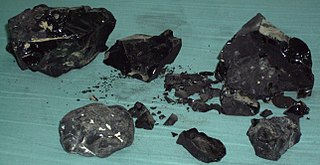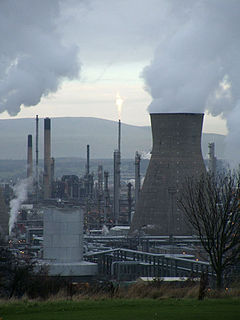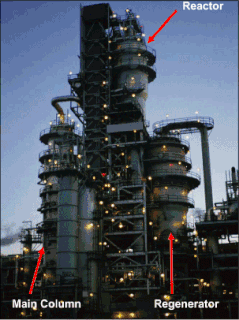Related Research Articles

Asphalt, also known as bitumen, is a sticky, black, highly viscous liquid or semi-solid form of petroleum. It may be found in natural deposits or may be a refined product, and is classed as a pitch. Before the 20th century, the term asphaltum was also used. The word is derived from the Ancient Greek ἄσφαλτος ásphaltos. The largest natural deposit of asphalt in the world, estimated to contain 10 million tons, is the Pitch Lake located in La Brea in southwest Trinidad, within the Siparia Regional Corporation.

An oil refinery or petroleum refinery is an industrial process plant where petroleum is transformed and refined into useful products such as gasoline (petrol), diesel fuel, asphalt base, fuel oils, heating oil, kerosene, liquefied petroleum gas and petroleum naphtha. Petrochemicals feedstock like ethylene and propylene can also be produced directly by cracking crude oil without the need of using refined products of crude oil such as naphtha. The crude oil feedstock has typically been processed by an oil production plant. There is usually an oil depot at or near an oil refinery for the storage of incoming crude oil feedstock as well as bulk liquid products. In 2020, the total capacity of global refineries for crude oil was about 101.2 million barrels per day.

Petroleum jelly, petrolatum, white petrolatum, soft paraffin, or multi-hydrocarbon, CAS number 8009-03-8, is a semi-solid mixture of hydrocarbons, originally promoted as a topical ointment for its healing properties. The Vaseline brand is a well known American brand of petroleum jelly since 1870.

The petroleum industry, also known as the oil industry or the oil patch, includes the global processes of exploration, extraction, refining, transportation, and marketing of petroleum products. The largest volume products of the industry are fuel oil and gasoline (petrol). Petroleum is also the raw material for many chemical products, including pharmaceuticals, solvents, fertilizers, pesticides, synthetic fragrances, and plastics. The industry is usually divided into three major components: upstream, midstream, and downstream. Upstream regards exploration and extraction of crude oil, midstream encompasses transportation and storage of crude, and downstream concerns refining crude oil into various end products.

Petroleum products are materials derived from crude oil (petroleum) as it is processed in oil refineries. Unlike petrochemicals, which are a collection of well-defined usually pure organic compounds, petroleum products are complex mixtures. The majority of petroleum is converted to petroleum products, which includes several classes of fuels.
Ashland Global Specialty Chemicals Inc. is an American chemical company which operates in more than 100 countries. Headquartered in Wilmington, Delaware, the company traces its roots back to the city of Ashland, Kentucky, where it was headquartered from 1924 to 1999. The company currently has five wholly owned divisions, which include Chemical Intermediates and Solvents, Composites, Industrial Specialties, Personal and Home Care, & Pharmaceuticals, Food and Beverage, and Agriculture. Until 2017, the company was the primary manufacturer of Valvoline.

Singapore Petroleum Company Limited, in short SPC, is a subsidiary of Chinese state-owned company PetroChina. It is involved in the exploration and production of petroleum, refining, trading and petroleum product distribution.

Samuel Martin Kier was an American inventor and businessman who is credited with founding the American petroleum refining industry. He was the first person in the United States to refine crude oil into lamp oil. Kier has been dubbed the Grandfather of the American Oil Industry by historians.

Lazăr Edeleanu was a Romanian chemist of Jewish origin. He is known for being the first chemist to synthesize amphetamine at the University of Berlin and for inventing the modern method of refining crude oil.

Fluid Catalytic Cracking (FCC) is the conversion process used in petroleum refineries to convert the high-boiling point, high-molecular weight hydrocarbon fractions of petroleum into gasoline, olefinic gases, and other petroleum products. The cracking of petroleum hydrocarbons was originally done by thermal cracking, now almost replaced by catalytic cracking, which yields greater volumes of high octane rating gasoline; and produces by-product gases, with more carbon-carbon double bonds, that are of greater economic value than the gases produced by thermal cracking.

Chennai Petroleum Corporation Limited (CPCL) is a subsidiary of Indian Oil Corporation which is under the ownership of Ministry of Petroleum and Natural Gas of the government of India. It is headquartered in Chennai, India. It was formed as a joint venture in 1965 between the government of India (GOI), AMOCO and National Iranian Oil Company (NIOC), having a shareholding in the ratio 74%: 13%: 13% respectively. From the grassroots stage CPCL Refinery was set up with an installed capacity of 2.5 million tonnes per year in a record time of 27 months at a cost of ₹430 million (US$5.7 million) without any time or cost overrun.

Honeywell UOP, formerly known as UOP LLC or Universal Oil Products, is an American multi-national company developing and delivering technology to the petroleum refining, gas processing, petrochemical production, and major manufacturing industries.
Havoline is a motor oil brand currently commercialized by Chevron. The brand had been previously owned by Texaco, until the company was acquired by Chevron in 2001.

The Attock Refinery Limited is a Pakistani petroleum company which is a subsidiary of UK-domiciled Attock Oil Company. It is active in crude oil refining in the country. The company is based in Rawalpindi, Punjab, Pakistan.
While the local use of oil goes back many centuries, the petroleum industry is of recent origin. Its current status as a key component of politics, society, and technology has its roots in the kerosene industry of the late 19th century. The use of the internal combustion engine for automobiles and trucks after 1900 was the critical factor in the explosive growth of the industry in the United States, Russia and the Middle East. When diesel fuel replaced steam engines in warships, control of oil supplies became a factor in military strategy—and played a key role in World War II. In the 20th century issues of air pollution led to government regulation. In the early 21st century environmental issues regarding global warming from oil and gas makes the industry politically controversial.
Bioasphalt is an asphalt alternative made from non-petroleum based renewable resources.

Automotive oil recycling involves the recycling of used oils and the creation of new products from the recycled oils, and includes the recycling of motor oil and hydraulic oil. Oil recycling also benefits the environment: increased opportunities for consumers to recycle oil lessens the likelihood of used oil being dumped on lands and in waterways. For example, one gallon of motor oil dumped into waterways has the potential to pollute one million gallons of water.

Petroleum refining processes are the chemical engineering processes and other facilities used in petroleum refineries to transform crude oil into useful products such as liquefied petroleum gas (LPG), gasoline or petrol, kerosene, jet fuel, diesel oil and fuel oils.

National Refinery Limited (NRL) is a Pakistani oil refinery which is a subsidiary of UK-domiciled Attock Oil Company. It is based in Karachi, Pakistan.
Tüpraş Izmir Oil Refinery is an oil refinery in Izmir, western Turkey. It is owned and operated by Tüpraş, the country's only oil refiner with four refineries.
References
- ↑ Heavy Liquid Asphalt Binder for Road Construction, Liquid Asphalt, Road Preserver and Dust Eliminator. Indian Refining Company. 1909-01-01.
- ↑ Happy Summer's Day in Old Kentucky. The Company. 1910-01-01.
- ↑ The Old Costly Method, the Economical Modern Method. The Company. 1910-01-01.
- ↑ Havoline Tours, Book 15, California. Indian refining Company. 1911-01-01.
- ↑ https://books.google.com/books?id=UiwCRAAACAAJ [ dead link ]